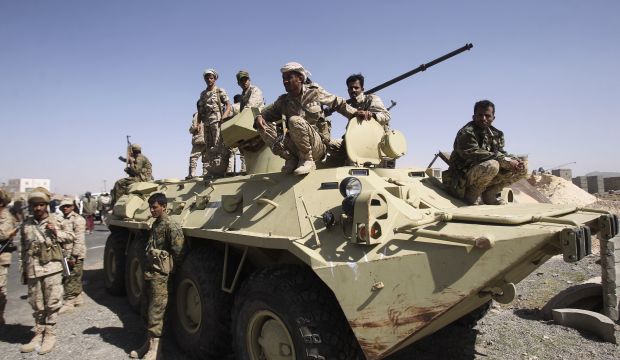
Army soldiers sit atop an armored personnel carrier stationed near a tribal gathering attended by tribesmen loyal to the Houthis in Haz, west of the Yemeni capital, Sana’a, on March 12, 2014. (Reuters/Khaled Abdullah)
Riyadh, Asharq Al-Awsat—It appears increasingly likely that Al-Qaeda in the Arabian Peninsula (AQAP) chief bomb-maker Ibrahim Al-Asiri was killed in a raid last week.
A Yemeni military official, speaking to Asharq Al-Awsat on the condition of anonymity, said that Asiri was “most likely” killed in an ambush in Shabwa Province carried out by counter-terrorism forces, part of a two-day security crackdown last weekend.
Meanwhile, a well-informed source in the Saudi military also speaking on the condition of anonymity said that Riyadh will not revoke warrants for Asiri’s arrest until his death has been confirmed through DNA testing.
Asiri was named one of Saudi Arabia’s most wanted terrorists by the Interior Ministry in 2009, and is believed to have been responsible for making bombs used in a number of terrorist attacks, including a suicide attack carried out by his brother, Abdullah Al-Asiri, targeting Interior Minister Prince Mohammed Bin Naif.
A joint force reportedly composed of both Americans and Yemenis killed at least 65 suspected terrorist suspects in an assault raid in Yemen’s Shabwa Province. Asiri is one of the most wanted Al-Qaeda figures in the region, second only to AQAP leader Nasir Al-Wuhayshi. The Saudi national is widely credited with designing explosive devices that can get past security measures, masterminding the 2009 underwear bomb plot and the 2010 cargo planes bomb plot.
The Pentagon declined to detail what role, if any, US forces played in the raid, but US media is reporting that while no US personnel took part in combat on the ground, US personnel did pilot the helicopters used in the attack. US drones are also believed to have been deployed.
The massive raid on AQAP targets in Yemen followed a recently released video showing approximately 100 suspected Al-Qaeda militants meeting at a training camp, including a speech by Wuhayshi in which he threatens new terrorist attacks on the US.
AQAP appears to have responded to the massive raid by killing four Yemeni security officers over the past 72 hours. Local media reported that AQAP had stormed a hospital in Azzan, in Shabwa province, in addition to two medical centers, forcing hospital staff to treat fighters wounded in the attack.
Agence France-Presse quoted a doctor as saying: “They forced us out of the [medical] centers along with other members of staff and brought in their wounded.”
The medical center doctor added that the AQAP militants were accompanied by “several doctors, including Arabs and foreigners.”
